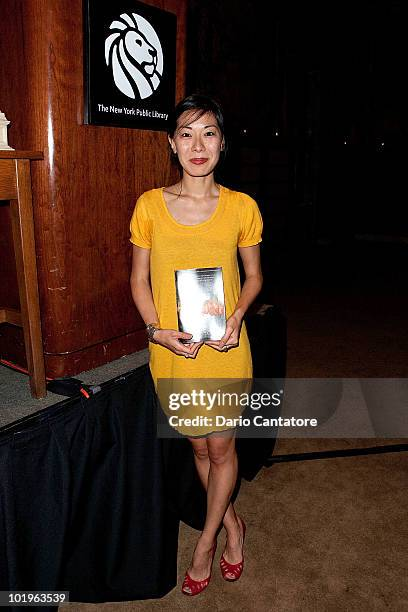Katie Kitamura, an acclaimed novelist and recent Guggenheim Fellow, is making waves in the literary scene with her latest novel, “Audition.” Set against the backdrop of a daunting New York City apartment, the narrative encapsulates the unsettling essence of midlife fiction, delving into themes of performance and the fragility of identity. Drawing inspiration from horror literature, Kitamura cleverly intertwines eerie elements with relatable experiences, tapping into a unique horror inspiration that resonates with her readers. As she explores the intricate web of familial relationships and personal secrets, the story unfolds with a hauntingly captivating charm. With a focus on the subtleties of human interaction, Kitamura’s work challenges our perceptions of reality, making her a significant voice in contemporary performance literature.
The literary craft of Katie Kitamura is becoming increasingly significant in today’s narrative landscape, particularly evident in her new work, “Audition.” This compelling piece of midlife exploration reflects on the intricate dynamics of family life set within the confines of a New York apartment. By embracing elements from horror genres, Kitamura effectively creates a chilling atmosphere that amplifies the complexities of adult relationships and authenticity. Her status as a Guggenheim Fellow shines a spotlight on her contributions to the themes of performance and identity in literature, which not only captivates but also invites critical discourse. As readers navigate through this tapestry of emotions and realities, Kitamura’s innovative storytelling reinforces the importance of narrative art in understanding the human experience.
Exploring the Horror Elements in Katie Kitamura’s ‘Audition’
In her latest novel “Audition,” author Katie Kitamura intertwines the themes of horror and midlife crisis, creating an unsettling narrative that resonates with readers experiencing their own uncertainties. Drawing inspiration from classic horror literature, particularly Ira Levin’s “Rosemary’s Baby,” Kitamura explores the uncanny aspects of motherhood and familial relationships within the confines of a New York City apartment. The protagonist is caught in a web of secrets and personal revelations, prompting a reflection on how our perceptions of those closest to us can shift dramatically, evoking feelings of fear and bewilderment.
The horror in “Audition” stems not from traditional jump scares or supernatural elements, but rather from the psychological tensions that arise in the mundane moments of daily life. Kitamura’s ability to craft this tension highlights her skill in performance literature, emphasizing the notion that what appears normal can conceal deeper anxieties. The uncanny feeling experienced by the protagonist when confronted with familiar figures evolving into strangers encapsulates a profound horror that many can relate to, particularly as people navigate the complexities of midlife.
Performance and Identity: Themes in Kitamura’s Work
Katie Kitamura’s works frequently delve into the concept of performance and identity, inviting readers to ponder how we present ourselves to others. In “Audition,” the central character is an actor whose awareness of the performances around her adds a layer of complexity to her interactions. This exploration speaks to the malleability of identity, which can evolve in response to external pressures and circumstances. Kitamura posits that our personas are forged through social interactions, making the understanding of self both intricate and sometimes misleading, especially when fundamental aspects of our identities remain hidden.
This fixation on performance is not merely a critique but an acknowledgment of its role in shaping societal relationships. Kitamura highlights how the characters navigate their lives as if rehearsing lines in a play, often unaware of how their scripted dialogues may obscure their true feelings. The tension and fragility of these performances are at the heart of Kitamura’s narrative style, encouraging readers to question the authenticity of their perceptions. Through her thought-provoking storytelling, she reminds us of the profound connections formed through shared experiences, even when veiled by the performances we enact.
The Pandemic’s Influence on ‘Audition’ and Performance Art
While “Audition” does not directly mention the pandemic, Katie Kitamura’s writing was undoubtedly influenced by the lived experiences during those tumultuous times. The novel’s setting—a claustrophobic apartment rife with familial tension—mirrors the realities faced by many during lockdowns. As characters grapple with coexistence in confined spaces, themes of isolation and interpersonal dynamics are magnified, resembling the psychological impacts of a pandemic. Kitamura’s keen observations reveal how the environment of fear and uncertainty is woven into the fabric of her narrative, demonstrating the inescapable interplay between personal and collective experiences.
Moreover, the absence of overt references to COVID-19 in the book allows for a more profound examination of the emotional landscape forged by such global events. The intricate relationships and hidden resentments experienced by the characters in “Audition” are more poignant within a pandemic context, where disruptions to daily life and intimacy often lead to existential questioning. Kitamura subtly captures this zeitgeist, exemplifying how personal narratives evolve through collective trauma, cementing her place in contemporary midlife fiction that resonates with a wide audience.
Katie Kitamura’s Role as a Guggenheim Fellow
Being named a Guggenheim Fellow is a significant recognition of Katie Kitamura’s contributions to fiction. This prestigious fellowship supports individuals who have demonstrated exceptional creative ability in their respective fields. For Kitamura, this honor not only validates her previous works, including her exploration of performance in literature but also provides her with the opportunity to further develop her craft. The fellowship allows her to immerse herself in an environment conducive to creative exploration, ultimately enriching her narrative style and thematic depth in upcoming projects.
Kitamura’s status as a Guggenheim Fellow reinforces the importance of supporting writers who venture into complex emotional territories. Her insights into the human condition, accentuated by her expertise in performance literature, align with the fellowship’s aim to foster the arts. As Kitamura continues to navigate themes of identity and the intricacies of personal relationships, this recognition enhances her visibility in the literary world, encouraging a dialogue about the significance of encompassing diverse narratives in literature.
The Intersection of Literature and Visual Art in Kitamura’s Work
Katie Kitamura’s narrative style is steeped in a profound appreciation for both literature and visual arts, a synergy that enriches her storytelling. Her works often evoke vivid imagery, engaging readers not just through written words but by painting scenes that resonate visually. Kitamura’s background and experiences, including her academic involvement, fuel her curiosity about how different art forms can coexist and influence one another. This interplay invites readers to experience the complexities of her characters’ lives in multifaceted ways, appealing to both their imaginations and emotional landscapes.
In “Audition,” the connections between visual art and literature are particularly palpable as the protagonist navigates her ambitions and fears while confronting the performance of everyday life. Kitamura’s ability to translate these experiences into compelling narratives emphasizes how art can enhance our understanding of our realities. This relationship between visual frameworks and storytelling not only enriches Kitamura’s own explorative journey but also serves as an invitation for readers to reflect on how art influences their interpretations of the human experience.
Writing Fiction in Challenging Times: Kitamura’s Perspective
In an era characterized by political and social upheaval, Katie Kitamura advocates for the essential role of fiction. As she explains, literature serves as a powerful tool for connection and understanding, allowing readers to navigate complexities in their own lives. For Kitamura, the act of writing becomes not just a personal endeavor but a crucial dialogue with the world, enabling individuals to grapple with truths that might otherwise be obscured. Her belief in the transformative power of stories underlines the importance of creativity in fostering resilience amidst chaos.
Kitamura’s discussions with her students highlight her commitment to emphasizing literature’s significance in generating empathy and insight during trying times. The ability to articulate and reflect on experiences through fiction aids in making sense of everyday realities and the societal shifts observed today. As she continues to advocate for the importance of writing, Kitamura’s insights serve as a reminder of the lasting impact literature can have on individual and collective narratives, underscoring the necessity of storytelling in a rapidly changing world.
The Myth of Full Disclosure in Relationships
Katie Kitamura raises thought-provoking questions about intimacy and privacy within relationships in her writing, particularly in “Audition.” She challenges the notion of full disclosure, suggesting that the desire for complete transparency may not be conducive to healthy relationships. Her perspective encourages readers to reconsider how much of ourselves we reveal to others and allows for the acknowledgment of personal boundaries in the complexity of intimacy. Relationships thrive not solely on transparency but also on mutual respect for individual privacy.
This notion resonates deeply in the context of performance literature, where the dichotomy between public persona and private self plays a crucial role. Kitamura illustrates this dynamic by highlighting moments where the ‘script’ of a relationship begins to feel thin, revealing the deeper, often unacknowledged layers that exist beneath the surface. By embracing this tension, Kitamura invites readers to appreciate the intricacies of human connections, advocating for a more nuanced understanding of intimacy that values both presence and personal space.
Navigating Midlife through Fiction: Themes in ‘Audition’
“Audition” stands out in the realm of midlife fiction, as Kitamura deftly captures the complexities inherent in this stage of life. The narrative echoes the feelings of uncertainty and introspection that often accompany midlife transitions, compelling readers to confront their own experiences. Kitamura’s portrayal of the protagonist’s struggles—balancing ambition, familial obligations, and existential questions—mirrors the broader societal context where individuals grapple with identity and purpose as they navigate the often tumultuous waters of adulthood.
In weaving these themes into her storytelling, Kitamura not only writes a compelling narrative but also provides a mirror for readers to explore their own midlife journeys. The familiarity of the protagonist’s challenges, compounded by the settings and influences from contemporary life, makes “Audition” a relatable exploration of the human experience. Kitamura’s exploration invites contemplation about the intersections of career, identity, and relationships, prompting readers to reflect on the intricacies and unpredictability of midlife.
The Power of Language in Shaping Reality
The importance of language in our lives is a recurrent theme in Kitamura’s works, including “Audition.” As she passionately argues, language is not merely a communication tool; it possesses the power to shape reality and influence perceptions. The precision with which writers use language can challenge existing narratives and evoke emotional responses, creating connections between the page and the reader’s inner world. Kitamura emphasizes the need for careful, intentional writing in an age where language can be misinterpreted or weaponized, underscoring the responsibility that comes with being a storyteller.
In a broader context, language serves as a bridge that unites diverse experiences and perspectives. Kitamura’s exploration into the significance of language in fiction highlights its potential for fostering understanding and empathy in turbulent times. By wielding words thoughtfully, authors can craft narratives that resonate deeply, encouraging audiences to critically engage with societal issues and envision alternative realities. In this way, Kitamura reinforces the idea that fiction is not only a reflection of our lived experiences but also a means to create dialogue and drive societal change.
Frequently Asked Questions
What themes from Katie Kitamura’s novel ‘Audition’ reflect her inspiration from horror literature?
In ‘Audition,’ Katie Kitamura draws substantial inspiration from horror literature, notably resonating with works like ‘Rosemary’s Baby.’ The novel explores themes of uncertainty and the uncanny, particularly through the lens of midlife experiences and familial dynamics. Kitamura’s characters grapple with unsettling truths and hidden fears, embodying horror’s ability to reveal the strangeness in familiar relationships. Her approach illustrates how performance and identity can shift, highlighting the thin line between reality and our perceptions, a hallmark of effective horror fiction.
How does Katie Kitamura address performance culture in her book ‘Audition’?
In ‘Audition,’ Katie Kitamura intricately explores performance as a core theme, focusing on the ways individuals present themselves and the roles they assume in life. The protagonist, an actor, navigates the complexities of her own identity and the dynamics of her family amidst the backdrop of New York City. Kitamura suggests that understanding ourselves often comes from observing and mimicking others, while simultaneously acknowledging the inherent privacy and secrets within relationships, making this a captivating aspect of her performance literature.
What awards has Katie Kitamura received for her literary work?
Katie Kitamura was recently honored as a 2025 Guggenheim Fellow in fiction. This prestigious fellowship recognizes her contributions to literature, including her critically acclaimed novels like ‘Audition’ and ‘Intimacies.’ Her writing often delves into psychological and emotional landscapes, earning her a prominent place in contemporary performance literature.
Is ‘Audition’ by Katie Kitamura considered midlife fiction, and if so, why?
Yes, ‘Audition’ is categorized as midlife fiction, as it delves into the complexities and uncertainties of life during middle age. The central character confronts challenges related to identity, family dynamics, and personal performance, all while navigating the chaotic environment of a New York City apartment. Kitamura’s portrayal highlights the anxieties and revelations that accompany this phase of life, reflecting on relationships and self-perception.
How did the pandemic influence the writing of Katie Kitamura’s ‘Audition’?
While Katie Kitamura’s ‘Audition’ does not explicitly reference the pandemic, it was written during that time, and she acknowledges that the familial tensions and confined spaces depicted may parallel pandemic experiences. The isolation and close quarters lead to heightened emotional and psychological tensions, subtly weaving current sociopolitical themes into her narrative.
What is the significance of language in Katie Kitamura’s writing, particularly in ‘Audition’?
Language plays a critical role in Katie Kitamura’s writing, including in ‘Audition,’ where it serves not only as a tool for storytelling but also for exploring complex emotions and societal realities. Kitamura believes that precise and carefully constructed language is vital in literature, lending power to the narratives that connect readers and challenge existing paradigms. Her exploration of language reflects on identity and performance, integral to the experiences her characters endure.
| Key Point | Details |
|---|---|
| Host Event with Katie Kitamura | Kitamura will be in conversation with Claire Messud at the Mahindra Humanities Center on April 21, 2025. |
| New Novel Release: “Audition” | Published earlier this month, it explores themes of middle age and family life in NYC, with an eerie twist. |
| Influence of Horror Genre | Kitamura has drawn inspiration from horror to depict feelings of uncertainty and hidden realities in relationships. |
| Reflection on the Pandemic | The novel was written during the pandemic and unexpectedly reflects themes related to confinement and family tensions. |
| Nature of Performance | Kitamura explores the idea that identity is shaped through performance in relationships, questioning the depth of personal connections. |
| Importance of Fiction | Fiction is seen as vital for understanding reality and imagining new possibilities, especially in the current sociopolitical climate. |
| Advocacy for English Majors | Kitamura defends the study of literature as a means of fostering connection and understanding, essential during divisive times. |
Summary
Katie Kitamura emphasizes the power of storytelling in her latest work, “Audition,” a profound exploration of the complexities of adulthood and relationships set against the backdrop of existential uncertainty. In her upcoming discussion at Harvard, she reflects on how literature serves as a critical tool for connection amidst chaos. The themes in Kitamura’s novel and her insights about performance in life resonate poignantly, particularly in today’s climate, which has heightened our awareness of the nuances and masks we wear in relationships.




